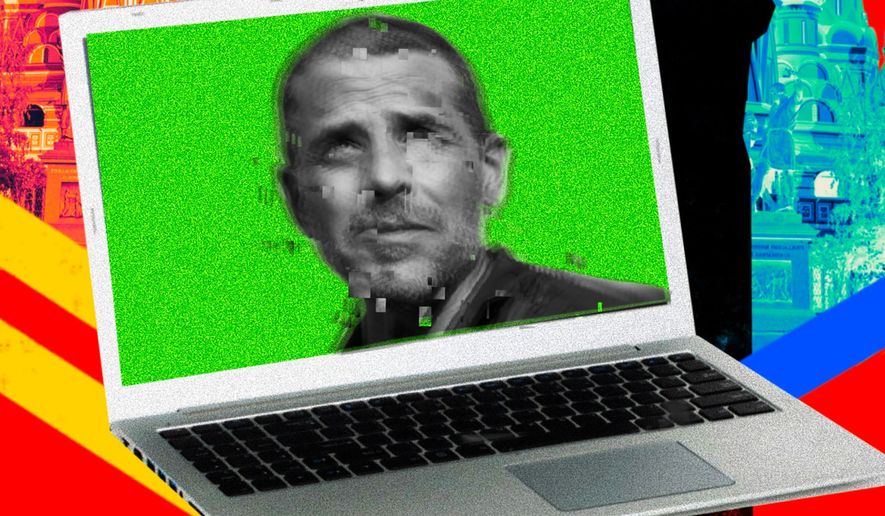OPINION:
On Oct. 18, 2020, I was one of the many retired senior officials who received an email from former acting CIA Director Michael Morell, asking us to sign the now-infamous letter that suggested that emails found on the laptop of Hunter Biden — the son of Joe Biden, the former vice president and then-presidential candidate — had “all the classic earmarks of a Russian information operation.”
At first glance, laying the blame on the Kremlin’s doorstep made sense. Russian President Vladimir Putin was notorious for mounting disinformation and espionage operations against Russia’s “main enemy,” the United States.
Special counsel Robert Mueller had indicted Putin confidant Yevgeniy Prigozhin’s Internet Research Agency for interfering in the 2016 U.S. presidential election, including through “deep fake” social media accounts. Mr. Mueller also indicted two Russian shell companies and 12 Russian military intelligence officers. Russian hackers had used phishing attacks to steal documents from Democratic nominee Hillary Clinton’s presidential campaign and then posted them on WikiLeaks.
Mr. Putin served for many years in the KGB before the collapse of the Soviet Union and was later director of Russia’s brutal Federal Security Service. His tactics reflect those of a coldly calculating spy under whose leadership Russia, among other crimes, poisoned former military intelligence officer Sergey Skripal and opposition leader Alexei Navalny with a banned chemical nerve agent; interfered in European elections; and launched malicious cyberattacks on U.S. government, private sector and key infrastructure networks.
But just because Mr. Putin had been flooding the zone for years with cloak-and-dagger espionage operations against us, it did not necessarily follow that he was behind the Hunter Biden laptop flap as well.
When I served at the CIA and we did not know an answer to a policymaker’s query, we asked our sources for more information in pursuit of more informed executive decision-making. Even as Mr. Morell was circulating the letter, then-Director of National Intelligence John Ratcliffe was saying publicly that the Hunter Biden laptop was “not part of some Russian disinformation campaign.”
The letter I was being asked to sign clearly stated: “We do not have evidence of Russian involvement — just that our experience makes us deeply suspicious that the Russian government played a significant role in this case.”
U.S. intelligence analysts needed more time to conduct forensics on the laptop and for the FBI to complete its investigation and unravel the details, especially the convoluted part about the computer having been found at a repair shop in Delaware.
But the email I received from Mr. Morell did not invite any further discussion or debate. The letter was a fait accompli. It was being passed around for signatures, not edits.
I’ve never been one to put my name to words someone else wrote on my behalf. Moreover, I was focused at the time on other, more important priorities: My wife, Kim, was late into her third year of fighting cancer, which would take her life in a few months. She entered hospice care a couple of weeks after the presidential election.
And so, I did not sign the letter and never responded to the email.
What I did not know — and only learned from private sworn testimony earlier this month that Mr. Morell gave to the House Judiciary Committee — was that the former acting CIA director had discussed the laptop issue with then-senior Biden campaign official Antony Blinken, now President Biden’s secretary of state.
I do not begrudge those who did sign the letter. As retired government officials, they are certainly entitled to exercise their freedom of speech (as long as they do not reveal classified information), especially if they believed it was their duty to ring the alarm bells about what they assessed as potential malicious Kremlin activity. It’s worth remembering that retired three-star Gen. Michael Flynn openly stumped during the 2016 presidential campaign for candidate Donald Trump and led crowds in “Lock her up” chants at the Republican National Convention.
I also won’t judge those who argue that the letter was a political errand for the Biden campaign.
But the American public should be careful to distinguish between retired and actively serving U.S. intelligence officers. Actively serving intelligence officers vote, but their exercise of civic duty is divorced entirely from their work.
My colleagues and I served in harm’s way in combat zones under the direction of presidents we voted for and others for whom we did not; we focused relentlessly on the mission we were given. We collected and guarded the truth with analytical precision, putting aside any predisposed ideological or political bias.
Ultimately, it’s up to our fellow citizens to do their own research, drawing on as wide a range of sources of information as they choose, and decide for themselves what to believe. That’s just one of the great benefits of living in a vibrant democracy.
• Daniel N. Hoffman is a retired clandestine services officer and former chief of station with the Central Intelligence Agency. His combined 30 years of government service included high-level overseas and domestic positions at the CIA. He has been a Fox News contributor since May 2018. Follow him on Twitter @DanielHoffmanDC.




Please read our comment policy before commenting.